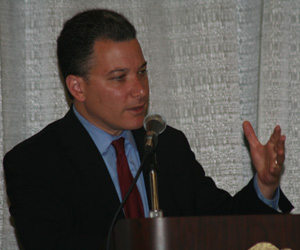Plenary speaker Professor Jeffrey Rosen discusses the future of privacy in a digital world at the Real Estate and Business Law Institute.
June 9, 2011 – What happens when privacy clashes with free speech? Jeffrey Rosen, professor of law at George Washington University, talked about protecting reputations in a digital world – as well as other topics concerning privacy issues and employers – today at the State Bar of Wisconsin PINNACLE’s Real Estate and Business Law Institute.
Rosen, the plenary speaker, discussed how one lives and works in a world where every blog entry, Facebook post, and Twitter tweet is archived forever, and forever susceptible to the reach of employers or other information seekers.
Rosen focused on what corporations and individuals can do to protect their private or sensitive information from others who may use it against them in the future. On the flip side, he talked about using information from the employer’s perspective.
“One of the most frequent questions I get is the monitoring,” said Rockford attorney Nancy Schilling, also licensed in Wisconsin. She said her corporate clients are interested in understanding what information is protected in terms of hiring employees. “This presentation was very informative, helpful, and current,” Schilling added.
Information lost
Rosen, a legal affairs editor at The New Republic and leading speaker on privacy issues, said unlike some European countries, American law generally does not allow people to undo what has already been done in terms of information on the Internet.

Jeffrey Rosen, professor of law at George Washington University, speaks to Wisconsin lawyers about privacy issues and technology at the Real Estate and Business Institute in Wisconsin Dells.
“In Europe, they proposed what’s called a ‘right to oblivion,’ and that means that if you post something that is true but embarrassing, and later think the better of it and want to take it down, you can petition to an international ‘commission of forgetfulness.’”
That measure, he said, might let someone escape their prior digital mistakes based on the circumstances. But currently, the U.S. has no “court of forgiveness.” Such a court, Rosen said, would clash with the First Amendment, which allows publication of truthful but embarrassing speech. So a solution routed in law may be difficult.
It may seem obvious enough: don’t post what could get you in trouble. But as we’ve seen in the news, not everyone follows that rule. Information is passed on unknowingly, others can get hacked, and still others may not realize what has been posted about them. Younger groups may not think of future consequences.
He used the example of Stacy Snyder, a college student and teacher-in-training who posted a photo of herself on MySpace while working as a student-teacher in a high school. In the photo, entitled “Drunken Pirate,” Snyder was wearing a pirate hat and holding a plastic cup. She was not allowed to graduate with a teaching degree.
“Today, she’s not a teacher,” Rosen said. “Her career was derailed, and I use her example as a cautionary tale … in a world that allows for no digital forgetting.”
What’s the solution?
Rosen said the solution might be technological, perhaps urging or requiring sites like Facebook to purge data after a set period of time.

Nancy Schilling, of Rockford, listens intently as Professor Jeffrey Rosen speaks to a packed house on day one of the two-day institute. Schilling said she deals with many of the privacy issues Rosen mentioned in her corporate practice.
Rosen noted one scholar, Harvard Law Professor Jonathan Zittrain, who suggested the notion of “reputation bankruptcy” as a mechanism to allow a person to wipe the reputation slate clean. After all, people can wipe their financial slates clean under the Fair Credit Reporting Act.
Perhaps a less dramatic solution, Rosen says, is the practice in Japan of using pseudonyms on social networking sites, where social networkers only release their real names to “real friends” or trusted sources, not a release for the world to see.
“As a result, the Japanese are able to maintain a much stronger barrier between their public and private activities,” Rosen said.
But the strongest technological fix, according to Rosen, is a new technology generally known as “disappearing data.” One application, from TigerText Inc.,allows people to send texts that become unreadable or irretrievable after time.
“It would not be difficult to extend this [model] to Facebook and other social networking status updates. So Facebook could, if it chose, make it easy when I post that drunken picture from Cancun,” Rosen joked, “to make it unreadable after a period of time.” He said he hopes market pressures will force these technological fixes.
